
 |
The Hours (2002) Directed by Stephen Daldry Cast: Meryl Streep, Julianne Moore, Nicole Kidman, Ed Harris, Stephen Dillane, Jack Rovello, John C. Reilly, Claire Danes, Allison Janney, Miranda Richardson, Toni Collette, Jeff Daniels, Eileen Atkins, Margo Martindale, Christian Coulson, Sophie Wyburd, Charley Ramm, George Loftus 2002 – 114 minutes Rated: Reviewed by Dustin Putman, January 11, 2003. 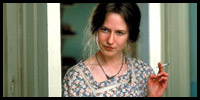 The pre-release talk on "The Hours," a prestigiously cast, literate adaptation of the acclaimed novel by Michael Cunningham, has unfairly skewed toward the beautiful Nicole Kidman's radical physical transformation into the plain, large-nosed Virginia Woolf. Directed with passionate fluidity by Stephen Daldry (2000's "Billy Elliot"), the film has so much going for it and leaves such an emotional wallop that to narrow its lasting impression down to a mere technical footnote concerning a famous actress' make-up would be to calamitously miss the point.
The pre-release talk on "The Hours," a prestigiously cast, literate adaptation of the acclaimed novel by Michael Cunningham, has unfairly skewed toward the beautiful Nicole Kidman's radical physical transformation into the plain, large-nosed Virginia Woolf. Directed with passionate fluidity by Stephen Daldry (2000's "Billy Elliot"), the film has so much going for it and leaves such an emotional wallop that to narrow its lasting impression down to a mere technical footnote concerning a famous actress' make-up would be to calamitously miss the point.
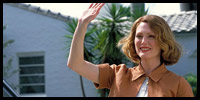 "The Hours" effortlessly depicts a meaningful day in the lives of three female characters, each living in a different locale in a different time period, and each unknowingly affected by—and connected to—the other. Following an attention-grabbing prologue set in 1941 when eternally unhappy writer Virginia Woolf (Nicole Kidman) drowned herself, time moves back to a memorable day in Richmond, England, circa 1923, as Woolf is just beginning to work out the outline for her future novel, "Mrs. Dalloway." In 1951 Los Angeles, pregnant housewife and mother Laura Brown (Julianne Moore) masks her unbearable loneliness from her husband Dan as she reads Virginia Woolf's said novel and contemplates suicide. And in 2001 New York City, Clarissa Vaughn (Meryl Streep) begins to emotionally unravel as she prepares a party celebrating her dying ex-husband, Richard's (Ed Harris), latest award achievements as a poet and novelist. Following a candid confrontation with Richard in which he calls her on living through everyone else's life rather than her own, Clarissa questions her self-worth and happiness, just as the character of Mrs. Dalloway did in the novel. While the characters of Virginia Woolf, Laura Brown, and Clarissa Vaughn are seemingly only linked through coincidence, it gradually becomes apparent that they are closer than one may suspect.
"The Hours" effortlessly depicts a meaningful day in the lives of three female characters, each living in a different locale in a different time period, and each unknowingly affected by—and connected to—the other. Following an attention-grabbing prologue set in 1941 when eternally unhappy writer Virginia Woolf (Nicole Kidman) drowned herself, time moves back to a memorable day in Richmond, England, circa 1923, as Woolf is just beginning to work out the outline for her future novel, "Mrs. Dalloway." In 1951 Los Angeles, pregnant housewife and mother Laura Brown (Julianne Moore) masks her unbearable loneliness from her husband Dan as she reads Virginia Woolf's said novel and contemplates suicide. And in 2001 New York City, Clarissa Vaughn (Meryl Streep) begins to emotionally unravel as she prepares a party celebrating her dying ex-husband, Richard's (Ed Harris), latest award achievements as a poet and novelist. Following a candid confrontation with Richard in which he calls her on living through everyone else's life rather than her own, Clarissa questions her self-worth and happiness, just as the character of Mrs. Dalloway did in the novel. While the characters of Virginia Woolf, Laura Brown, and Clarissa Vaughn are seemingly only linked through coincidence, it gradually becomes apparent that they are closer than one may suspect.
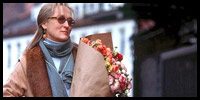 In a morose premise that largely revolves around such dark subjects as depression, fear, and suicide, "The Hours" overflows with vitality, both in its faultless structure and near-perfect collection of performances. The capaciously written, multilayered screenplay (by David Hare), interweaving the three women and their separate predicaments, crosses time and character with such narrative assuredness and transitional accuracy that the three storylines beautifully morph into a whole. Surprisingly, none of the subplots are given the short thrift, and each is handed enough time for the actors to fully explore their fascinating roles.
In a morose premise that largely revolves around such dark subjects as depression, fear, and suicide, "The Hours" overflows with vitality, both in its faultless structure and near-perfect collection of performances. The capaciously written, multilayered screenplay (by David Hare), interweaving the three women and their separate predicaments, crosses time and character with such narrative assuredness and transitional accuracy that the three storylines beautifully morph into a whole. Surprisingly, none of the subplots are given the short thrift, and each is handed enough time for the actors to fully explore their fascinating roles.
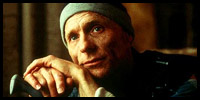 With one exception, "The Hours" holds the distinction of having the most stunning and talented ensemble of the year. The leads do complete justice to their demanding parts. As Virginia Woolf, a woman both at war with herself and the world, Nicole Kidman (2001's "The Others") is stunning, particularly in her obvious dedication to becoming Woolf rather than merely playing a part, and succeeding with every ounce of her being. All of Woolf's varying thoughts and feelings are brought to considerable life via Kidman's auspicious work, saying more through her eyes than she ever says through her mouth. This is never more true than in a chillingly effective scene in which Woolf lays herself down next to a deceased bird and stares into its eyes, desperately searching for something that cannot be found.
With one exception, "The Hours" holds the distinction of having the most stunning and talented ensemble of the year. The leads do complete justice to their demanding parts. As Virginia Woolf, a woman both at war with herself and the world, Nicole Kidman (2001's "The Others") is stunning, particularly in her obvious dedication to becoming Woolf rather than merely playing a part, and succeeding with every ounce of her being. All of Woolf's varying thoughts and feelings are brought to considerable life via Kidman's auspicious work, saying more through her eyes than she ever says through her mouth. This is never more true than in a chillingly effective scene in which Woolf lays herself down next to a deceased bird and stares into its eyes, desperately searching for something that cannot be found.
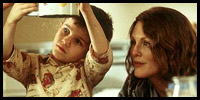 At this point, it would almost be boring to say that Meryl Streep (2002's "Adaptation") is brilliant, perhaps the finest actress of her generation, if it didn't hold so much truth. Streep takes her every role and works magic into it, finding the nuances and unchartered depth that a lesser performer never could have achieved. As Clarissa, a longtime editor with a longtime girlfriend, Sally (Allison Janney), and a college-aged daughter, Julia (Claire Danes), who comes to the realization that she has never allowed herself to be happy, Streep is nothing short of dramatic powerhouse.
At this point, it would almost be boring to say that Meryl Streep (2002's "Adaptation") is brilliant, perhaps the finest actress of her generation, if it didn't hold so much truth. Streep takes her every role and works magic into it, finding the nuances and unchartered depth that a lesser performer never could have achieved. As Clarissa, a longtime editor with a longtime girlfriend, Sally (Allison Janney), and a college-aged daughter, Julia (Claire Danes), who comes to the realization that she has never allowed herself to be happy, Streep is nothing short of dramatic powerhouse.
 As uniformly fine as Kidman and Streep are, it is Julianne Moore who threatens to steal the film. For all of the awards notices Moore is receiving for "Far From Heaven," it is her brutally heartbreaking turn as the internally smothered Laura Brown that most deserves the end-of-the-year accolades. A scene in which a broken and depressed Laura sits in the bathroom, attempting to conceal her weeping as her husband waits for her to come to bed, is a showcase if there ever was one for how marvelous Moore can be.
As uniformly fine as Kidman and Streep are, it is Julianne Moore who threatens to steal the film. For all of the awards notices Moore is receiving for "Far From Heaven," it is her brutally heartbreaking turn as the internally smothered Laura Brown that most deserves the end-of-the-year accolades. A scene in which a broken and depressed Laura sits in the bathroom, attempting to conceal her weeping as her husband waits for her to come to bed, is a showcase if there ever was one for how marvelous Moore can be.
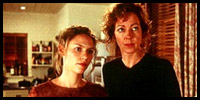 The supporting cast is exquisite, making unforgettable impressions with only one or two scenes each. Ed Harris (2001's "A Beautiful Mind") poignantly leads the way as Clarissa's ex, Richard, a writer dying of AIDS who mourns the time he has lost to write about all of the things he had hoped to accomplish in his life. Other actors—particularly Jeff Daniels (2002's "Blood Work"), Claire Danes (2002's "Igby Goes Down"), Stephen Dillane (2002's "The Truth About Charlie"), Allison Janney (2000's "Nurse Betty"), John C. Reilly (2002's "Chicago"), and Toni Collette (2002's "About a Boy")—are superlative. The single weak link can be found in newcomer Jack Rovello, who often has trouble passably emoting as Laura's young son Richie. Rovello is a cute child, even charismatic, but he fails to sell his lines as he should have.
The supporting cast is exquisite, making unforgettable impressions with only one or two scenes each. Ed Harris (2001's "A Beautiful Mind") poignantly leads the way as Clarissa's ex, Richard, a writer dying of AIDS who mourns the time he has lost to write about all of the things he had hoped to accomplish in his life. Other actors—particularly Jeff Daniels (2002's "Blood Work"), Claire Danes (2002's "Igby Goes Down"), Stephen Dillane (2002's "The Truth About Charlie"), Allison Janney (2000's "Nurse Betty"), John C. Reilly (2002's "Chicago"), and Toni Collette (2002's "About a Boy")—are superlative. The single weak link can be found in newcomer Jack Rovello, who often has trouble passably emoting as Laura's young son Richie. Rovello is a cute child, even charismatic, but he fails to sell his lines as he should have.
 In a motion picture filled with running themes and messages, "The Hours" is most sharply and touchingly about three women who wish for nothing more than to break free from the restrictions of their boringly defined lives in a bid to finally find inner solace. Virginia Woolf, Laura Brown, and Clarissa Vaughn may be from different worlds, but their needs—like those of all human beings—are universal. "The Hours" is an astonishing piece of work and an actors' dream, about lives that feel real and characters that are anything but superficial in their wants. It is never too late, the film seems to be saying, for a person to turn things around.
In a motion picture filled with running themes and messages, "The Hours" is most sharply and touchingly about three women who wish for nothing more than to break free from the restrictions of their boringly defined lives in a bid to finally find inner solace. Virginia Woolf, Laura Brown, and Clarissa Vaughn may be from different worlds, but their needs—like those of all human beings—are universal. "The Hours" is an astonishing piece of work and an actors' dream, about lives that feel real and characters that are anything but superficial in their wants. It is never too late, the film seems to be saying, for a person to turn things around.
©2003 by Dustin Putman |
 |













